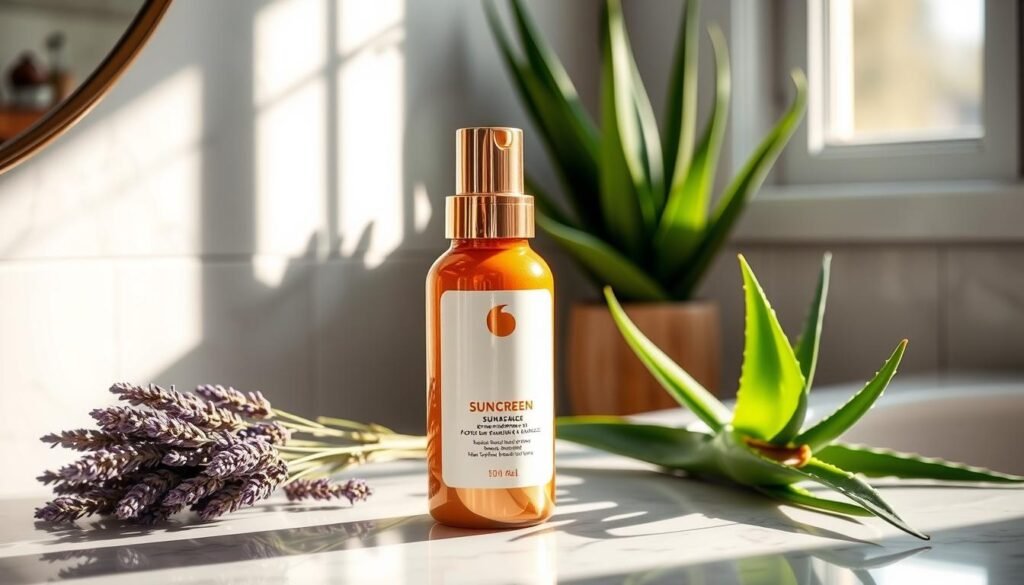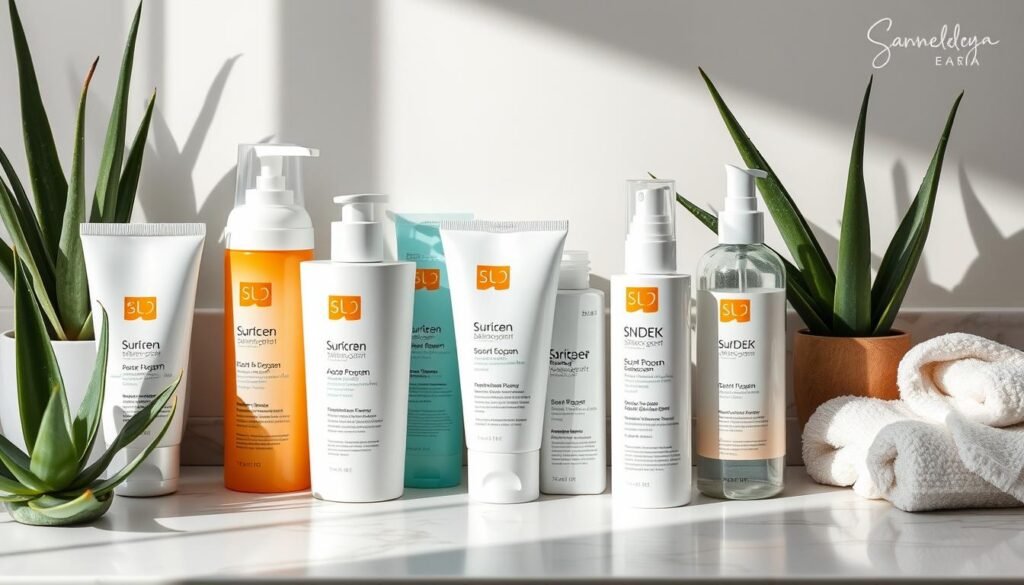Did you know nearly 90% of skin aging comes from the sun? For acne-prone skin, this shows how vital sun protection is. While focusing on acne treatment is common, many forget about sunscreen. But, skipping it can worsen acne and damage the skin more.
Sunscreen is key for acne-prone skin because sunlight can make inflammation worse. It also causes dark marks and scars. Using sun protection every day is crucial. It helps keep your skin healthy and stops the cycle of breakouts and dark spots. The right sunscreen protects from the sun and helps heal and maintain your skin’s look.
To pick the best sunscreen, look for products made for sensitive, acne-prone skin. Experts suggest non-comedogenic, oil-free sunscreens that soothe the skin. They protect without blocking pores. For more on choosing the best options, check this out: sunscreen for acne-prone skin.
Key Takeaways
- Sun exposure significantly impacts skin aging, making sunscreen vital.
- Neglecting sun protection can worsen existing acne and lead to scarring.
- Incorporating sunscreen helps maintain healthy skin and prevent hyperpigmentation.
- Choosing non-comedogenic, oil-free sunscreens is crucial for acne-prone individuals.
- Daily use of sunscreen can significantly improve the complexion over time.
The Importance of Sun Protection for Skin Health
Protecting your skin from the sun is key to keeping it healthy. Exposure to UV rays without protection can lead to problems. These include premature aging, sunburn, and even skin cancer. Studies show UV rays can make certain skin conditions worse. This means sun safety should be a top priority, especially for those with sensitive or acne-prone skin. For them, the sun can make symptoms worse.
Using sunscreen every day is vital. It prevents damage and keeps skin in good condition. Adding sunscreen to your daily skincare routine helps keep your skin strong and healthy. Using the right sunscreen for your skin type prevents damage.
Remember, the damage from the sun adds up over time. Making sun protection part of your daily routine is a smart move. It protects your skin from harm, leading to better skin health and longer-lasting youthfulness.
Understanding Acne-Prone Skin
Acne-prone skin is unique from other types. Excess oil, clogged pores, and hormone changes often cause it. Knowing what triggers your acne is crucial.
Many think acne is just for teens or those with oily skin. But, it can affect anyone, at any age. Stress or certain foods might worsen it for some. It’s vital to find a skincare routine that addresses your specific issues.
Using sunscreen is also key for those with acne-prone skin. It helps prevent irritation from the sun. By choosing the right sun protection, you can keep your skin healthier.
To learn more about managing acne-prone skin, read more here. Better understanding leads to improved skin care.
Why Sunscreen is Essential for Acne-Prone Skin
Understanding the significance of sunscreen for acne-prone skin is vital. It not only guards against harmful UV rays but also helps lower inflammation. This can prevent flare-ups.
The Role of SPF in Acne Management
Choosing the right SPF can protect skin from damaging sunlight. Studies show a link between sun exposure and worse acne. High SPF products lessen inflammation, cutting down breakout risks.
Using sunscreen every day is key to fighting current acne and preventing new problems. It acts as a shield for your skin.
How Sunscreen Prevents Inflammation
Sunscreens protect and soothe the skin at the same time. Many have ingredients that calm redness and irritation from acne. This can improve skin look and help manage acne.
It’s essential for anyone with skin issues to use sunscreen daily. It’s a simple step that can make a big difference in your skin care routine.

Choosing the Right Sunscreen for Acne-Prone Skin
Finding the perfect sunscreen is very important for those with acne-prone skin. It can really make a difference in preventing breakouts. Non-comedogenic sunscreen is key because it doesn’t block pores. This is crucial for keeping skin clear. Knowing about broad spectrum SPF is also vital. It protects skin from harmful UV rays.
Look for Non-Comedogenic Formulas
When looking for sunscreen, choose non-comedogenic ones. These don’t clog pores and are lighter, making them good for oily or combo skin. Here are some good ingredients to look for:
- Glycerin
- Aloe Vera
- Witch Hazel
- Salicylic Acid
This method helps keep skin clear and boosts your skincare routine’s effectiveness.
Understanding Broad Spectrum SPF
Broad spectrum SPF protects against UVA and UVB rays. UVA rays cause aging, and UVB causes sunburn. For acne sufferers, broad spectrum SPF prevents skin damage and irritation. At least SPF 30 is recommended for effective protection.
Choosing a sunscreen that’s non-comedogenic and has broad spectrum SPF is wise. It not only shields the skin but also aids acne treatment. Using it daily can improve skin health and appearance.
Common Ingredients in Sunscreens to Avoid
People with acne-prone skin need to be careful about sunscreen ingredients. The right products are key to keeping skin clear and healthy. Staying away from certain ingredients cuts down on breakouts and irritation.
Pore Clogging Agents
Some sunscreens have ingredients that clog pores, leading to breakouts. Oils and silicones cover the skin, trapping dirt, bacteria, and oil. Choose products labeled non-comedogenic. They let your skin breathe and prevent pore blockage.
Harsh Chemicals and Their Effects
Harsh chemicals like some alcohols and synthetic fragrances can harm sensitive skin. They cause redness and swelling. Long-term, they may damage your skin’s barrier and make acne worse. When buying sunscreen, look for ones without these harsh ingredients. The right sunscreen ingredients keep your skin clear and protect against UV rays.
Integrating Sunscreen into Your Skin Care Routine
Using sunscreen every day is key for keeping skin healthy, particularly if you have acne. A good strategy for applying it can also make acne treatments work better.
Daily Application Tips
For the best sun protection, you need to apply sunscreen the right way. Here’s what’s important:
- Use a generous amount of sunscreen, aiming for about a nickel-sized amount for the face.
- Apply sunscreen at least 15 minutes before going outside to allow it to absorb into the skin.
- Reapply every two hours, or more frequently if sweating or swimming occurs.
- Don’t forget to apply to often-missed areas like the ears, neck, and scalp.
Timing and Layering with Other Acne Treatments
How you layer your products is key to a good skin care routine. Here are some tips when using acne treatments:
- Apply treatments first, allowing them to fully absorb before applying sunscreen.
- Choose lightweight, non-comedogenic sunscreens to prevent clogging pores.
- Time your application to ensure that treatments do not interfere with sunscreen effectiveness.
Following these tips makes adding sunscreen to your daily routine easy. It ensures you get the best protection while effectively managing acne.
How Sunscreen Affects Hyperpigmentation
If you have acne-prone skin, it’s key to know how sunscreen plays a role. Especially when it comes to preventing hyperpigmentation. UV light can make skin discoloration worse, including dark marks from past acne. This is harmful as it can darken acne scars, making your skin tone uneven.
Using sunscreen can help keep your skin tone even. Studies show that using SPF regularly protects against UVA and UVB rays. These rays make hyperpigmentation worse. Sunscreen not only stops new dark spots but also helps fade old ones.
Adding sunscreen to your daily skin care can change things if you fight skin discoloration. Here are a few insights on how sunscreen helps with hyperpigmentation:
- Prevents UV-related skin damage that leads to new dark spots.
- Helps maintain an even skin tone by stopping scars from darkening.
- Improves the overall look of your skin, making it brighter.
By using sunscreen every day, you can improve your skin health and clarity. This is crucial for managing hyperpigmentation.
| Benefits of Sunscreen | Effects on Hyperpigmentation |
|---|---|
| Daily protection from UV rays | Reduces darkening of existing scars |
| Prevents new spots from forming | Helps even out skin tone |
| Supports skin healing | Aids in lightening dark spots over time |
Oil Control and Shine Reduction with Sunscreen
People with acne-prone skin often face a big challenge. They need to control oil and protect their skin at the same time. The perfect sunscreen can help achieve both a matte look and sun protection. Nowadays, many products are made for these specific needs. They protect the skin from the sun without making it oily.
Mattifying sunscreens are a great choice for controlling oil. They soak up extra oil, making the skin look fresh. Using these sunscreens not only protects from the sun. It also reduces shine that can appear throughout the day.
When picking a sunscreen, look for “oil-free” or “matte finish” labels. These products are made to cut down on oil while protecting from the sun. Ingredients like silica and clay help with shine control. They make the skin look balanced without causing acne.
- Non-Comedogenic: Ensure the product does not clog pores.
- Broad Spectrum: Provides protection against both UVA and UVB rays.
- Long-Wearing: Look for water-resistant options for extended use.
Adding the right sunscreen to your skincare routine makes a big difference. With regular use, skin looks better and stays matte. At the same time, it’s well-protected from the sun.
Dermatologist Recommended Products for Acne-Prone Skin
Finding the right sunscreen can be tough if you have acne-prone skin. Dermatologist recommended sunscreen products are key. They protect you from UV rays and prevent pimples. Here are some top picks for your skin’s unique needs.
| Product Name | Key Ingredients | Benefits |
|---|---|---|
| EltaMD UV Clear Broad-Spectrum SPF 46 | Niacinamide, Zinc Oxide | Controls oil production, calms the skin |
| Neutrogena Hydro Boost Water Gel Lotion SPF 30 | Hyaluronic Acid, Glycerin | Provides hydration without clogging pores |
| La Roche-Posay Anthelios Clear Skin Oil-Free Sunscreen SPF 60 | Thermal Spring Water, Perlite | Helps absorb excess oil, prevents shine |
Choose sunscreens that are non-comedogenic and feel light. Applying them regularly is key to avoid acne. For more tips on the best sunscreens for acne-prone skin, check out this useful guide.

Conclusion
Sunscreen is super important for skin care, especially if you have acne-prone skin. This article showed why using sunscreen every day is key to controlling acne. The right sunscreen protects your skin from the sun’s harmful rays. This helps decrease inflammation and lowers the chance of getting dark spots.
It’s also crucial to choose a non-comedogenic sunscreen with broad-spectrum SPF. This type of sunscreen does a better job at guarding against sun damage. It also helps keep your skin healthy over time. Using the right sunscreen not only helps prevent acne but also makes your skin look clear and bright.
Making sun protection a key part of your skincare routine is essential. Understanding how it helps with skincare can help you reach your skin health goals while dealing with acne. Adding sunscreen to your daily routine is a smart move for anyone wanting better skin. It’s a commitment that pays off by giving you healthier skin.